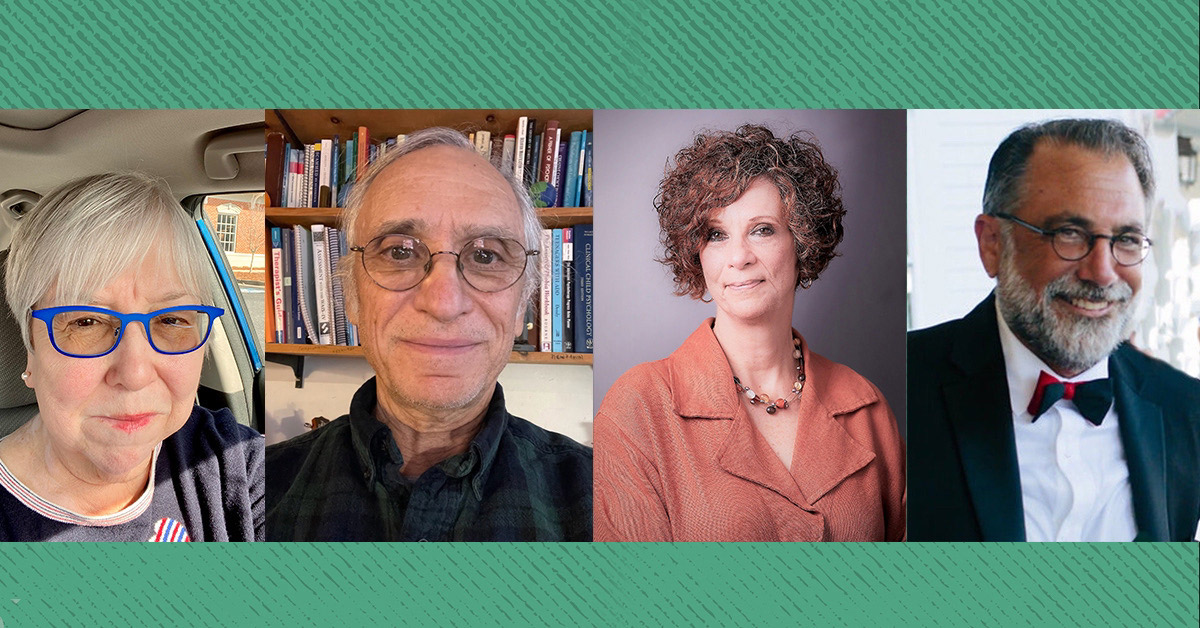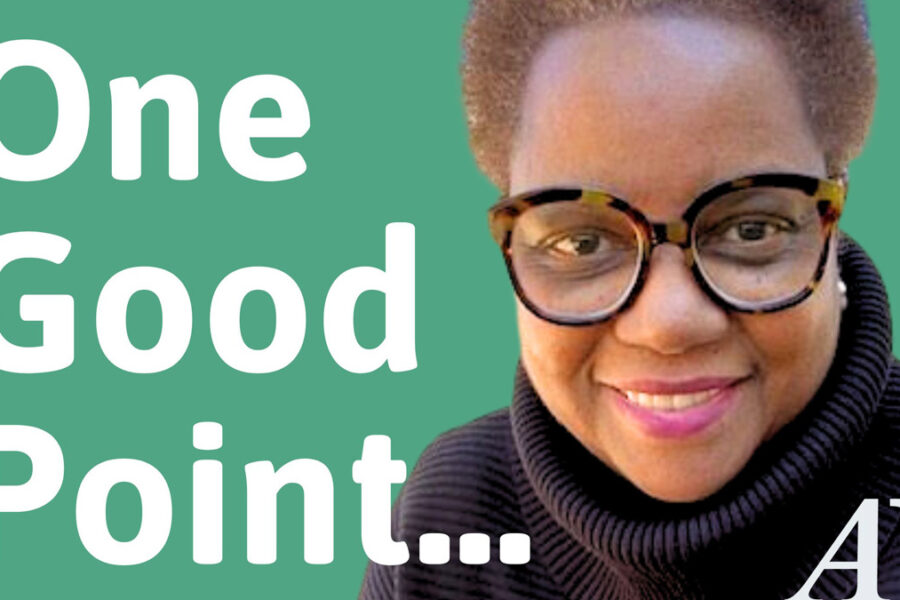For nearly forty years, Clinical Psychology has been taught at the doctoral level on Antioch’s New England campus. Over those years, the Doctoral Program in Clinical Psychology (PsyD) has gained a reputation for its community of active, engaged, and socially conscious faculty and students. That’s what four alumni of the program who recently retired from careers in psychology that connected them with their alma mater recently told us.
The program, they say, fostered social responsibility and an environment of collaboration that helped forge collegial relationships that span the length of many longtime careers. And these careers have been fascinating, full of highlights and achievements that richly illustrate the long-term impact of their Antioch education. Most inspiring is how each alum has continued to contribute to the world in impactful ways.
Read on to learn about how Donna DiCello challenged whiteness and investigated grief and loss among Italian-Americans, Sharon Gordon researched post-delirium cognitive impairments and trained clinicians to treat transgender patients with kindness and expertise, Daniel Papapietro worked at the intersection of mental illness and the criminal legal system, and Phil Sanguedolce dedicated his life to school systems changing the direction of young people’s lives. Together, these alumni are a fascinating cross-section showing the powerful impact that PsyD alumni have made and continue to make across the decades.
From Antioch to the Greater World
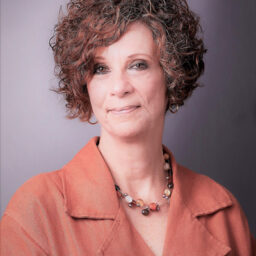
Choosing Antioch for its social justice focus and quality of education, Donna DiCello graduated from the PsyD program in 1996. She credits the program’s high-quality training and mentoring as intellectual touchstones that led to an array of post-grad professional opportunities. Beginning with her own small, part-time psychology practice, the clinical training and model of teaching she experienced at Antioch provided her with an enriched education that would later aid her in becoming the Associate Director for the University of Hartford’s clinical psychology doctorate program, a role she served in for thirteen years after working for many years in community mental health settings. For DiCello, Antioch provided intellectual stimulation, and her professors in the program modeled how to be a good faculty member, instructor, mentor, and writer, all of which served her in that position.
The program gave her space to develop a love of intellectual inquiry and psychoanalytic thinking. And it gave her a network that she stayed connected with over an impactful career.
“Relationships have stayed,” she says, “Collegiality and friendship have continued over time, and I’ve remained in touch with faculty; my Antioch experience is part of my psyche.” In addition to her career with the University of Hartford, DiCello continues to serve as a clinical faculty member and ombudsperson for the psychology fellows at Yale University’s Department of Psychiatry in the medical school. She also teaches seminars to the fellows on clinical supervision and grief, and she has taught adjunct courses at Antioch and seminars with the Connecticut Society for Psychoanalytic Psychology. At the Connecticut Society, she has also been involved with the Committee for Equity and Diversity Education and Action, serving in the Racialized Experience Study Group in which they examine experiences of whiteness and white privilege and discuss how to do better in communities and consulting rooms. “I think that my experience at Antioch helped bolster my commitment to engage in that experience,” she says. In service to her commitment to training, she also served as Chair of the Early Career Committee.
A highlight of DiCello’s career was a book collaboration with Lorraine Mangione, who serves as Clinical Psychology Professor and Director of Practica in the Antioch New England PsyD Department. Mangione and DiCello both experienced the loss of their fathers at roughly the same time, and in the aftermath, they engaged in many conversations with one another. This planted the seed of collaboration. In researching the book, DiCello, and Mangione interviewed 51 Italian-American women across all professions and ages. These ended up coming together in Daughters, Dads, and the Path Through Grief: Tales From Italian America, which was published in 2015. In addition to this text, DiCello has co-authored numerous professional articles on grief and culture, and has presented that work at regional and national conferences.
DiCello is also a poet, having published poems in a variety of literary journals. She recently received her first Pushcart Prize and Best of the Net nominations. “Psychology and poetry form a double helix for me,” she says. After recently retiring and closing her full-time clinical practice, she returned to her passion for creative writing and not only began writing more poetry, but also enrolled in a writing program, New Directions in Writing, with The Washington-Baltimore Center for Psychoanalysis. This program allows clinicians, academicians, and writers to explore genres through a psychoanalytic lens.
“Retirement is such an interesting life phase”, DiCello states. “While I have been fortunate to have had a vibrant, interesting, and fulfilling career, it is bittersweet to see that arc winding down. At the same time, a host of possibilities stretch ahead, and I hope to also have a vibrant retirement! It’s a perfect time to focus more on my writing and also engage in more climate action work, another passion.” Now that she is a retiree, she will also focus on cultivating and nurturing relationships with her spouse, friends, family, and nature. And, of course, she will continue to write.
Healing One Veteran at a Time
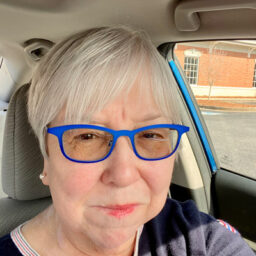
Sharon Gordon had an MA in Counseling when she started working in a New Hampshire hospital specializing in substance abuse. But that hospital gave her the chance to work closely with a number of older patients, many of whom were cognitively impaired. Gradually, she became fascinated by the brain and the ways it could end up injured. As she pursued this interest, she attended a weekend workshop on neuropsychology, and it was there that she learned about Antioch University and its PsyD program. Eventually, she decided that returning to school was the right thing, so she applied and was accepted. She began her studies in 1989.
Gordon says that, upon starting the program, “I felt like a fish out of water.” But during her four years, she learned how to be more open to the spectrum of her feelings, and she became more comfortable in sharing them. The program, she says, made it possible to be and feel successful.
Antioch also taught her tolerance and openness to new ideas. Her previous master’s degree program had focused on behavioral aspects, but at Antioch, her instructors gave her a much wider perspective. Her studies inspired her to embrace new and different experiences, both in life and in practicum. The fact that the faculty wanted students to be successful and to feel pride in being a professional was an essential encouragement.
After graduating in 1993, she took her experience working with cognitively impaired persons and helped to found the American Delirium Society, now an international society. For her day job, she started working in Veteran Affairs in the Tennessee Valley Healthcare System, where she worked for 23 years.
She also became a professor at Vanderbilt University Medical School. Here, she says, she “wanted to increase diversity in the student population.” And she succeeded. She directly aided in recruiting and accepting interns from underrepresented backgrounds, including those who were blind and students who identified as Black, Indigenous, and persons of color. She also made a point of recruiting women-identified students—at the time, among faculty, only three were female versus twelve who were male. She worked with medical students and residents from many different cultures, including Indian, Pakistani, Afghani, Nigerian, Ethiopian, and African-American.
One highlight of her career has been advocating for and supporting transgender students and patients. She was involved in training several psychologists for evaluations on hormone replacements, around which there was, at the time, limited awareness. Her program won an award for its progressive and inclusionary practices. This advocacy and support, Gordon says, is how she has most contributed to the world.
Retirement has so far not gone exactly how Gordon hoped it would—mainly because of the coronavirus pandemic. She did take a two-week cruise to the Mediterranean in 2019, but other travel plans were put on hold due to COVID. In the near future, she plans to get involved in volunteer literacy efforts, having been the president of her high school’s library club, to help increase literacy in her community. For now, she says that she “enjoys retirement by exercising daily with yoga and Zumba and participating in a local book club.”
Disrupting Stigmas with Forensic Psychology
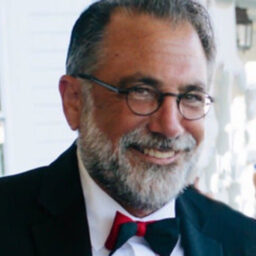
Daniel Papapietro worked as a full-time Emergency Medical Technician in the local Police and Fire departments. He also worked part-time in the local hospital’s Department of Psychiatry’s Crisis Intervention Department. He was debating whether to continue to pursue training as a paramedic or join the police department when he was introduced to Antioch by a colleague and persuaded to consider a career in the mental health field. He was impressed with the institution’s humanitarian approach to teaching and positive relationships between students and faculty. Antioch’s leadership and clear, organized way of thinking helped immensely. He graduated with a Master’s Degree in Counseling Psychology in 1987 and subsequently returned to earn a PsyD in 1994.
This led Papapietro to spend decades of his career working in both inpatient and outpatient hospital settings practicing institutional psychology. He had his own private practice for 25 years and a devoted career in forensic psychology. Living and working in Connecticut, his focus “was on a long-term psychoanalytic approach in working with patients who were criminally insane,” he says—which is to say, operating as a forensic psychologist in a maximum security hospital within the criminal legal system. Much of his forensic work involved long-term individual psychotherapy with individuals who had committed heinous crimes due to mental illness. To fully understand the nature of the crime and the individual’s mental illness regularly involved having to review autopsy photos, incident reports, and crime scene photographs and taking in the reality of where patients were coming from when they had committed violent crimes. “Working with individuals who had committed horrible and brutal crimes, and reviewing with them the details over and over in psychotherapy, resulted in cumulative levels of stress and exhaustion, but it was tremendously rewarding in terms of how I helped unwell people change in significant ways,” he says. He also came to much more fully understand the clinical notion of vicarious traumatization as it affected many of those who worked in the same setting.
Fifteen years ago, after an investigation by the U.S. Department of Justice, Dr.Papapietro was asked to create a psychotherapy service within the forensic hospital to ensure that every patient had access to individual therapy. As Chief of the Psychotherapy Service, he ensured that, in addition to cognitive therapies, patients had long-term psychodynamic psychotherapy, which was considered critical to their clinical progress. As part of his new role as Chief of Psychotherapy, he created and led a weekly psychotherapy supervision and consultation seminar for all hospital clinical staff. Additionally, he was also one of the teaching and supervising faculty of Connecticut Valley Hospital’s APA-accredited predoctoral Internship program. He took the work on with passion and credits his experiences at Antioch with faculty who had nurtured his interest with their passion for psychodynamic therapy
As a psychologist, Papapietro felt it was his personal responsibility to find the humanity in each patient, no matter how psychiatrically unwell they were. “Sometimes the best way to make the world better is one person at a time,” he says. He used his private practice as a way to balance his institutional work, aiming to help one person at a time regardless of their diagnosis or crimes. An important part of his job was providing expert testimony before the Psychiatric Security Review Board to explain a patient’s clinical progress and to address questions about the patient’s level of risk in terms of danger to self or others. For the past 10 years, he has held a faculty position as Assistant Clinical Professor of Psychiatry at the Yale Medical School, coordinating and supervising the psychotherapy work of psychiatrists training to be forensic specialists through Yale’s Forensic Fellowship Program. And just recently, as part of his retirement, he has accepted a similar position as Assistant Clinical Professor of Psychiatry at the University of Connecticut’s School of Medicine, Supervising psychiatry residents in psychotherapy and having a role in structuring the residency program’s psychodynamic therapy track.
He has even returned to Antioch more than once to facilitate seminars on the psychoanalytic or psychodynamic approach. He has authored or co-authored a half-dozen articles on forensic psychiatry. He attributes Antioch’s doctoral program to giving him the confidence to write scholarly articles across a wide range of subjects. “There is not a tremendous interest in working with the criminally and severely mentally ill,” he says, so he takes pride in speaking on the topic when opportunity presents itself to interest other psychologist in working with individuals with severe and persistent mental illness, whom he describes as “a population often forsaken by psychotherapists.” As a result, long-term psychoanalytic psychotherapy is not offered at very many hospitals treating severe and chronic mental illness.
Today, Papapietro still resides in Connecticut, and he is semi-retired. For him, this means working 10-12 hours per week instead of 60. As a side practice and passion, he is a watchmaker, often taking apart mechanical watches to repair and put back together, which began as a curiosity to find out what makes them tick.
Psychology in the Schools
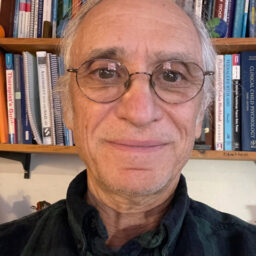
When Phil Sanguedolce was deciding where to go for his PsyD, it was imperative that he attend a program where he could continue to work while studying. He also insisted on a forward-thinking program—but it had to be accredited by the American Psychological Association. This led him quite naturally to Antioch, where he graduated from the PsyD program in 1997.
His degree enabled him to become a licensed clinical psychologist, a career that he continues on to this day. He has, over the intervening decades, worked in a variety of settings, including a community mental health center, a school center, and a private practice. He also teaches at the college level, although today, he is semi-retired. A few years ago, he was awarded a distinguished graduate teaching award at Plymouth State University—though he tries not to focus on accolades. Throughout his career, the skills he learned at Antioch, from thinking both critically and with openness to always working to understand the self and how to perceive the world, have contributed to his professional success.
One of his career highlights was the experience of testing a young high school student who lacked focus, was unmotivated and thought he wouldn’t amount to anything. When he was seven, a teacher told him that he was “stupid,” and he internalized that message. But Sanguedolce’s testing showed quite the opposite—the student had a learning disability, which in this case, could be managed and overcome. Once the student learned of his diagnosed disability, this gave him a roadmap for how to overcome this disability. The student went on to get better grades, and when he was applying to college, Sanguedolce wrote a letter of recommendation and explanation about what the student had overcome. He got in and went on not just to graduate but also to become a professional airline pilot. Sanguedolce is still in touch with the student and his family today, and the student’s mother has told him that she still carries that letter of recommendation in her purse to this day. “You can’t always listen to everybody,” says Sanguedolce, “because people might not tell you the right thing.” This showed him the power of diagnosis—and also of caring.
Sanguedolce has dedicated his life to school systems, facilitating testing, therapy, and teaching in rural New Hampshire. In the world of psychology, the standard role in schools is to focus on testing for learning disabilities and navigating the bureaucracies around special education, but, after completing his PsyD, Sanguedolce added to that work a focus on broad-based mental health for the entire school community. He adopted a model of service within the school that was very much like a small mental health center.
Above all, he aims to not only succeed in his systemic role as a school psychologist but also to be a trusted part of the community. When he worked in the school full-time, he volunteered to do other duties, like joining lunch duty or going to school dances, so that he wasn’t just a man in an office who certain students were sent to see. He wanted to prevent students from feeling that they were outliers or otherwise weird if they happen to need to pay him a visit. But this paid other dividends: he ended up doing some sports psychology with the volleyball team, he provided career counseling, and he even befriended students who were musicians, as he himself is.
One student he remembers in particular. This student was failing in all of his subjects when they first talked, but Sanguedolce tried to draw him out in a nonjudgmental way. He quickly learned that the student did enjoy one class: woodworking. And he also had a passion for playing guitar. “Have you ever thought of becoming a luthier?” said Sanguedolce, explaining that this would mean making and repairing guitars. Soon, the student and Sanguedolce were looking up luthiery schools, and the student ended up attending one and having a successful career in that field.
Sanguedolce mainly works with children and adolescents between the ages of 12-21, though sometimes he has worked with toddlers or adults. As long as he is able to help one person move one step forward in this world, he feels he can help the human race move one step forward.
Today, he is consulting and providing direct psychological services to students in several local school districts. He and his wife are also an acoustic music duo, performing as the Sweetbloods. (The name comes from the translation of their last name.) They perform over a hundred gigs annually in the Meredith area where they live. In this, too, as in his career as a psychologist, Sanguedolce spends his time and energy working to promote the happiness of others.
Conclusion
Antioch’s New England PsyD program has for decades now fostered social responsibility and inspired long and productive careers. But as is clear in the stories of these four retirees—not all of whom are quite done giving back—the program has also led to alumni who are creatively and effectively changing the world one student or patient at a time. And sometimes, they are helping heal and strengthen their entire communities.

